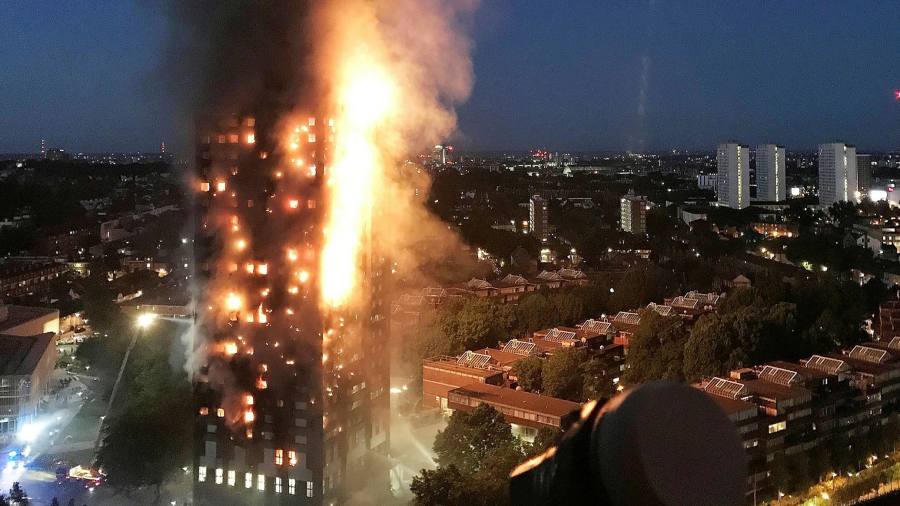[ad_1]
The cladding used on Grenfell Tower burnt 10 times faster than a sister product in a safety test conducted more than a decade before the deadly fire, but its manufacturer did not notify customers and continued selling the more flammable variant until after the blaze.Â
The failure to disclose the test results came to light on Tuesday at the inquiry into the 2017 fire at the London block of flats, in which 72 people died.Â
The inquiry was shown a document from 2004 which described the relative fire safety performance of two variants of Reynobond PE cladding sold by Arconic Architectural Products, the French subsidiary of US company Arconic, which supplied cladding to Grenfell: one in bent “cassette†form, the other a flat “riveted†panel.
The tests were carried out in France and found that the cassette version of the product burnt 10 times faster than the riveted version, producing seven times more heat.
Claude Schmidt, chief executive of AAP, denied that the test was the company’s “deadly secretâ€.Â
But when asked by the inquiry’s counsel, Richard Millett, if he accepted that, without the Grenfell fire, no one would know about the test, Schmidt replied “yesâ€.Â
But the inquiry heard that AAP regarded the centre’s conclusion as a “rogue result†and did not alert customers to the different fire safety performance of the variants.
The company also failed to disclose the results to the British Board of Agrément, a certification body which subsequently gave AAP’s product a stamp of approval.
The inquiry has previously concluded that the cladding used on Grenfell “acted as a source of fuel†and was the “principal reason why the flames spread so rapidlyâ€.Â
Despite its fire-safety performance being “spectacularly worse,†according to Millett, the cassette variant of the cladding was used on Grenfell because the Royal Borough of Kensington & Chelsea, which funded the block’s refurbishment, preferred the aesthetic, the inquiry had previously heard.Â
The results of the 2004 test were not shared with the borough.Â
On Monday, the inquiry saw internal emails which showed that AAP stopped recommending sales of its Reynobond PE product to French customers in 2016 owing to fire safety concerns. Instead, the company marketed a fire resistant version of the same product.Â
But AAP only stopped selling the more flammable PE product for use on architectural projects in the UK in the weeks following the Grenfell fire.Â
Schmidt denied on Tuesday that the cassette version of the PE cladding was dangerous in itself, but said “it did have some risks which were dealt with differently in different countries and according to legislationâ€.Â
“There are many things we use every day which do give rise to certain risks,†he added.
Up until this week, Schmidt had not attended the inquiry, citing an arcane French law banning disclosure to foreign courts. A number of other witnesses based in France, including Claude Wehrle, a senior member of AAP’s technical team, have yet to attend.Â
Schmidt agreed to attend the inquiry last month after pressure from survivors of the Grenfell fire and an indication from the French embassy that French law was not intended to prevent witnesses giving evidence abroad.
[ad_2]
Source link





